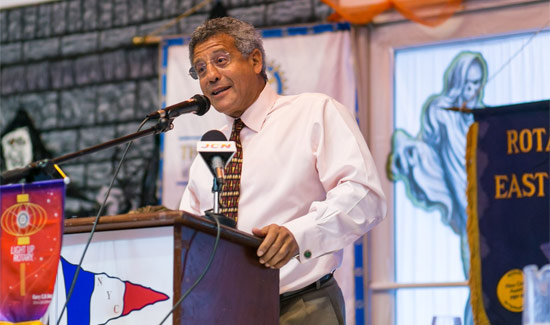
Over time, it appears that we have been repeatedly electing certain politicians who are outright pinheads and tin men, full of childish braggadocio but devoid of a national plan or any appreciable outlook for the country. For far too long, local politics has been dominated by parochial figures who cannot see beyond their backyards.
With a general election on the horizon, it is past due for Bahamian voters to cease the practice of electing visionless politicians merely on the basis of personality and flair. In our country, an electoral mechanism should be implemented to remove elected legislative members who sometimes are found to be inept benchwarmers.
Frankly, many of today’s politicians – as in yesteryear – fancy themselves to be among an unaccountable elite. After a general election, a number of locally elected politicians have been known to adopt an air of master-like superiority, suddenly becoming scarce and indifferent or unproductive and unconcerned about representing the interests of their constituents while seemingly disregarding the notion that they are servants/agents of the people. No doubt, with an election bell about to toll—to use the words of the multitalented architect Pat Rahming – politicians will be “comin’ out of the woodwork just like worm.”
A process must be instituted to make politicians directly answerable to their constituents in the years between general elections, rather than the current setup where a lousy MP could “live fat of the hog” for five years.
Isn’t it perplexing how certain constituencies remain undeveloped, yet they adopt some form of political tribalism and consistently vote one way every election cycle?
An electoral recall is a political device that would undoubtedly be a valuable check on the power of venal, self-serving public office holders, from the local administrative units to the central government. It would perhaps eliminate the notion of a safe constituency/seat, increase an MP’s accountability and empower Bahamians to rid their constituencies of certain politicians who may be nothing more than lying hypocrites. It is nearly impossible to give any local politician the heave-ho before the end of their five year term!
Furthermore, going forward the Bahamas’ constitution should be modified to limit a politician’s parliamentary stay (elected) to three consecutive/inconsecutive terms, particularly since many politicians have stayed beyond their “best before” (expiry) date and appear to have abused the parliamentary process while stifling the rise of young up-and-comers who may possess new ideas. Moreover, if a formerly elected (or unelected) politician loses his/a seat twice, back-to-back, he should not be allowed to run for a third time in that or another constituency.
Similar to the US presidential term limits, a prime minister – like an MP – should be limited to two five-year terms and the leader of a party should emerge from transparent, democratic primaries.
Relative to electoral recalls, any politician who displays a lack of fitness, engages in an act of malfeasance or misconduct while in office, violates their oath of office, neglects his/her duties, willfully misuses, misappropriates or converts public funds or property associated with their elected/appointed office, is convicted of a felony and/or is corrupt or incompetent, should face the electorate in an emergency, US-style recall election.
In about 36 US states (examples being California, Georgia, Washington, Michigan, Colorado, New Jersey, etc) recall elections are held at the state and/or local administrative levels – from city councils and school boards to state governors.
When petitioning for a recall election, at least 45-55 per cent of the eligible voters casting ballots in a constituency during the last general election should be accounted for.
Moreover, the signature requirement for the recall of district officers such as chief councilors and local government representatives on the Family Islands should be 20-25 per cent of the residents in the settlement that they represent.
Once a recall petition is certified, a special by-election should immediately be called, with a slate of new candidates – and possibly the incumbent – seeking election to the newly vacant post.
California voters have attempted to have 32 gubernatorial recalls since 1911, with only the much-publicized 2003 recall of former Governor Gray Davis actually reaching the ballot. According to CNN, in a most “surreal” campaign Californians elected movie/body building celebrity Arnold Schwarzenegger over 134 candidates to replace Davis as governor. Mr Davis had been recalled after he was seen to have mismanaged the state budget.
In 1921, former North Dakota governor Lynn J. Frazier, along with his attorney general and commissioner of agriculture, was removed from office. Arizona voters also attempted to recall former Governor Evan Mecham in 1988, but he was impeached by the House of Representatives before that election date.
While opponents of recalls may claim that they may prohibit unpopular decisions from being made, the notion of majoritism that works for our five-year election cycles should also apply for a system of recall.
In bolstering their democratic ideals, the New Jersey state constitution addresses recalls by stating:
“The people reserve unto themselves the power to recall, after at least one year of service, any elected official in this State or representing this State in the United States Congress. The Legislature shall enact laws to provide for such recall elections. Any such laws shall include a provision that a recall election shall be held upon petition of at least 25% of the registered voters in the electoral district of the official sought to be recalled.”
Article 72 of the 1999 Constitution of Venezuela allows for the recall of elected representatives—inclusive of the President. In 2004, a recall referendum was undertaken to recall President Hugo Chavez. The citizens of Venezuela decided to retain his services!
Amending the Constitution to include articles on electoral recalls, term limits and electoral primaries would make local politicians more accountable, knowing that their election to public office is subject to revocation, and be demonstrative of the ideals of direct democracy where Bahamians would have a greater sense of choice and trust in our democratic institutions.
If such an amendment does materialize, it should be set out that any MP being targeted for recall ought to be allowed to respond after which time the Speaker of the House of Assembly should publicly declare the petition and forecast an impending by-election.
Nick Clegg, the British Deputy Prime Minister and leader of the Liberal Democrats, has severely criticized the “gentlemen’s club” world of Westminster politics.
In the Bahamas, there appears to be a “gentlemen’s club” as certain unaccountable MPs/politicians are suspected of having a conflict of interest while misusing public funds or making politically and financially expedient decisions, however, there is no prosecution or impeachment of elected, central government representatives. Is there hushed, protectionist code between elected politicians?
Elected politicians should also be subjected to impeachment proceedings, which is a legal process whereby the House can bring changes against an MP with the Senate serving jury.
However, with the current good ol’ boys network, hell would probably freeze over before this or a recall mechanism is adopted! That is, unless the people rise up and demand it.
Real representative government is that where politicians elected by the people truly represent their constituents, monitor spending of public funds, vigorously debate issues rather than the foolishness about who has sweethearts or is are homosexuals, make decisions that are in the best interest of the nation and monitor the actions of government.
If I conducted a check – and I have and will release my findings at a later date – how many constituency offices have been consistently operational from 2007 to now? How many MPs kept in touch with, and listened to, their constituents in the years preceding the upcoming general election?
By: Adrian Gibson


